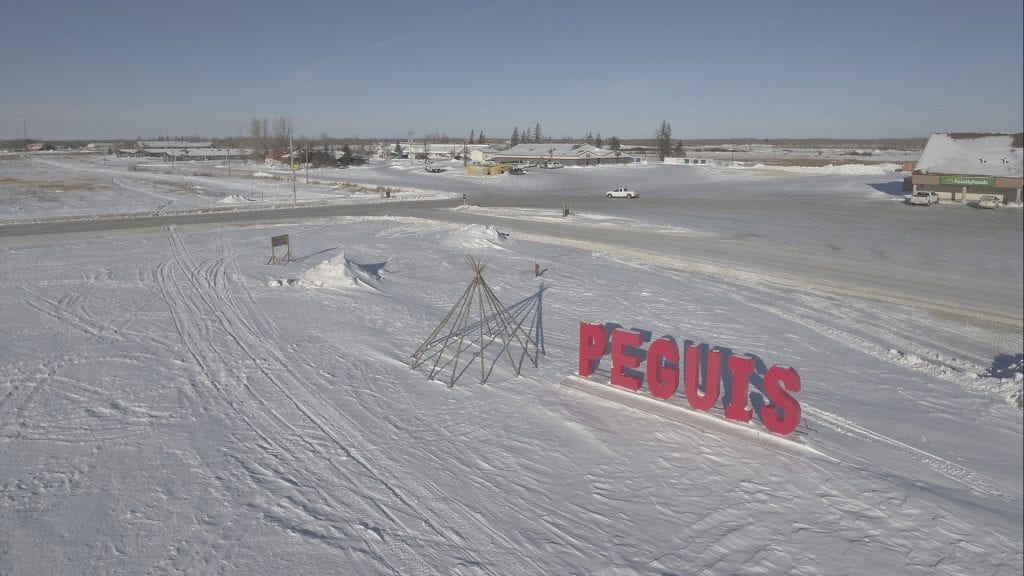
A red sign marks Peguis First Nation in Manitoba. Photo: APTN file
Members of the largest First Nation in Manitoba say they are shocked to learn their community has been under ‘default management’ since 2016.
“Omg, so it is true,” said Dawn Thomas, a band member who posts financial information on the Peguis First Nation Hot Topics Facebook page.
A rumour about third-party or co-management lit up social media recently after chief and council held a rare meeting on a weekend.
But council, which has been communicating virtually during the pandemic, didn’t address the rumour, Thomas said.
APTN News confirmed the financial situation with Indigenous Services Canada (ISC).
Default management
“Peguis First Nation is currently under a Recipient Managed – Management Action Plan (RMMAP), which is the lowest level of default management,” ISC said in a statement.
“Note that we are not able to provide an end date for default, as that is dependent on the unique circumstances of each recipient, and on the successful resolution of the situation leading to the default.”
Peguis, which is 190 km north of Winnipeg, receives federal funding for programs and services for approximately 4,000 members who live on reserve.
ISC said the band has been operating under the RMMAP since April 1, 2016.
Peguis Councillor Annette Spence confirmed ISC was helping the band through what she called an “intervention where they work with First Nations to help manage the nation.
Third party
“They don’t do third party anymore,” she said, referring APTN to ISC for more information.
“We are working closely for our community and will get through our issues.”
ISC told APTN it’s “not anticipating a change to the First Nation’s default status and there are no plans for a forensic audit.”
It did not reveal what prompted Peguis to require the intervention in the first place.
The band posts its annual audited financial statements on its website, but nowhere does it announce the “default” or co-management situation.
Financial statement
Its 2020 financial statement shows the band has a $35-million annual operating budget and $153 million in liabilities, including a $122-million loan. It’s paying $10 million in annual interest costs.
ISC said a band is in default when:
– The health, safety or welfare of the community is at risk or being compromised,
– The recipient has not met its obligations under the funding agreement,
– An auditor has flagged concerns with the recipient’s annual audited financial statements,
– The recipient’s financial position places the delivery of funded programs at risk.
– The recipient is bankrupt or at risk of bankruptcy; or has lost or is at risk of losing its corporate status.
Three levels
Leslie Michelson, a spokesperson for ISC, said there are three levels of default:
- Recipient Managed: the recipient develops a management action plan, acceptable to the department, to remedy and recover from a default and prevent its recurrence.
- Recipient-Appointed Advisor: a recipient-appointed advisor is contracted by the recipient as part of their management action plan to address the default and prevent its recurrence.
- Third-Party Management: a third-party manager, contracted by the department, administers the department’s funding for the delivery of programs and services and works to remedy the underlying causes of the default. This level of default management is a temporary measure to ensure the continued delivery of programs and services to community members.
Thomas suggested confirmation of the default financial position would not be well received by band members.
“Doubt that many will appreciate that kind of news, particularly because of the pandemic focus,” she said in an email.
‘Mandate’
Spence said ISC had “the mandate” to look after and manage First Nations.
“We are working closely for our community and will get through our issues,” she added. “But I am sure ISC is where you can get more information.”
Michelson said bands that are in default are regularly re-assessed to determine whether their level of default management should be escalated or de-escalated.
“When deciding what measures to take, the department weighs risks and circumstances associated with the default, and the ability of the recipient to remedy the default,” she said in an emailed statement.
“The decision to place a recipient in default management is not taken lightly and the appointment of a third-party manager is used as a last resort to ensure the continued delivery of programs and services to community members.”
Editor’s note: The story originally said that Peguis First Nation was in co-management. The story was revised 02/03/21 to correct the financial term to default management.










